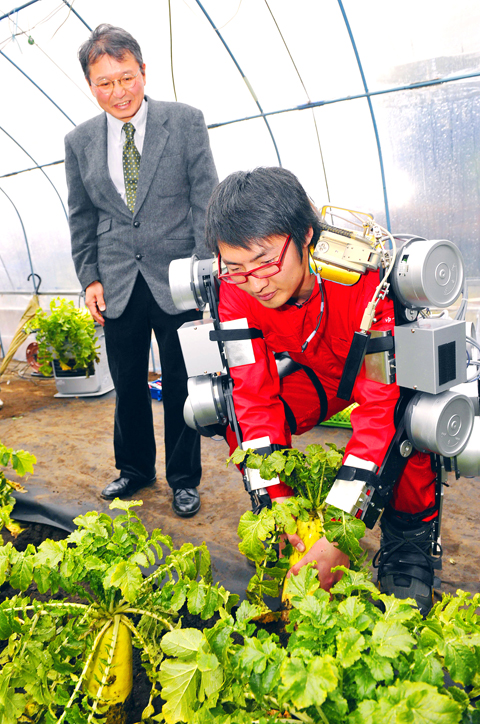Japanese researchers on Friday unveiled a robot suit designed to help reduce the heavy burden of harvesting as the nation’s farm industry faces an aging, shrinking workforce.
Researchers at Tokyo University of Agriculture and Technology demonstrated a prototype wearable assistance machine equipped with eight motors and 16 sensors.
The 25kg device is designed to assist elderly farmers who need support for their leg muscles and joints when they keep a crouching position or lift their arms high.

PHOTO: AFP
DEMONSTRATION
In a demonstration, a person wearing the suit pulled radishes from the ground and picked oranges from high branches like a robot.
The researchers said they were looking to commercial use of the suit in two to three years at an initial price of between ¥500,000 and ¥1 million (US$5,000 and US$10,000).
“Human robotic technology is being applied to various industries but it has great potential in the agricultural industry, in which people have to bear a heavy burden,” Shigeki Toyama said.
“That’s especially obvious in Japan, where the industry is rapidly aging and its population is shrinking,” he said.
COSTLY LABOR
He said he expected robotics would increasingly be put to use in farming in Japan and smaller European countries, where there is not enough space for large-scale agriculture and manual labor is costly.
Japan has been developing robots to serve in a growing number of jobs including office receptionists and security guards.

DISASTER: The Bangladesh Meteorological Department recorded a magnitude 5.7 and tremors reached as far as Kolkata, India, more than 300km away from the epicenter A powerful earthquake struck Bangladesh yesterday outside the crowded capital, Dhaka, killing at least five people and injuring about a hundred, the government said. The magnitude 5.5 quake struck at 10:38am near Narsingdi, Bangladesh, about 33km from Dhaka, the US Geological Survey (USGS) said. The earthquake sparked fear and chaos with many in the Muslim-majority nation of 170 million people at home on their day off. AFP reporters in Dhaka said they saw people weeping in the streets while others appeared shocked. Bangladesh Interim Leader Muhammad Yunus expressed his “deep shock and sorrow over the news of casualties in various districts.” At least five people,

ON THE LAM: The Brazilian Supreme Court said that the former president tried to burn his ankle monitor off as part of an attempt to orchestrate his escape from Brazil Former Brazilian president Jair Bolsonaro — under house arrest while he appeals a conviction for a foiled coup attempt — was taken into custody on Saturday after the Brazilian Supreme Court deemed him a high flight risk. The court said the far-right firebrand — who was sentenced to 27 years in prison over a scheme to stop Brazilian President Luiz Inacio Lula da Silva from taking office after the 2022 elections — had attempted to disable his ankle monitor to flee. Supreme Court judge Alexandre de Moraes said Bolsonaro’s detention was a preventive measure as final appeals play out. In a video made

It is one of the world’s most famous unsolved codes whose answer could sell for a fortune — but two US friends say they have already found the secret hidden by Kryptos. The S-shaped copper sculpture has baffled cryptography enthusiasts since its 1990 installation on the grounds of the CIA headquarters in Virginia, with three of its four messages deciphered so far. Yet K4, the final passage, has kept codebreakers scratching their heads. Sculptor Jim Sanborn, 80, has been so overwhelmed by guesses that he started charging US$50 for each response. Sanborn in August announced he would auction the 97-character solution to K4

SHOW OF FORCE: The US has held nine multilateral drills near Guam in the past four months, which Australia said was important to deter coercion in the region Five Chinese research vessels, including ships used for space and missile tracking and underwater mapping, were active in the northwest Pacific last month, as the US stepped up military exercises, data compiled by a Guam-based group shows. Rapid militarization in the northern Pacific gets insufficient attention, the Pacific Center for Island Security said, adding that it makes island populations a potential target in any great-power conflict. “If you look at the number of US and bilateral and multilateral exercises, there is a lot of activity,” Leland Bettis, the director of the group that seeks to flag regional security risks, said in an